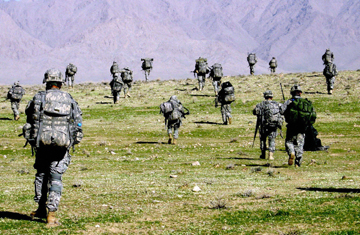
UNION POWER: Formed to protect Western Europe from the Soviet Union, NATO has endured, with troops, such as these in Afghanistan, deployed around the globe
(2 of 2)
Today, of course, with Berlin a model of communitarian virtue, "keeping the Germans down" looks not just anachronistic, but absurd. But look closer. The U.S. continues to act as a crucial counterweight within Europe. Same function, different players. The Poles, Czechs, Hungarians and others don't want to be left alone with France and Germany, the Continent's two heavies. For the smaller players, it is nice to have the U.S. in the game as a big brother. In fact, Germany does not want to be left alone with itself, knowing full well that its size and strength will always be a source of concern for the rest. Why else would reunified Germany keep U.S. bases and soldiers on its soil when Russian troops are 2000 km away?
It is NATO's singular historical achievement that it has denationalized Europe's defense policies. Ever since 1949, the nations of Europe, which in the past had always been at each other's throats, no longer had to worry about, let alone arm against, one another. This is what that fabled military integration is all about: a common command, control and communication structure, a 60-year-old tradition of teamwork, common maneuvers and equipment, even a common language, which is English. No alliance in history has ever built such enduring habits of cooperation, and nobody wants to ditch that culture, not for a long time.
Classical alliances were always one-war stands. So after the demise of the Soviet Union, NATO was pooh-poohed as an alliance desperately searching for a new enemy. True enough: a business whose wares are no longer demanded declines. So NATO has diversified and expanded into new markets. The irony is rather thick. In the hottest days of the Cold War, NATO never fired a shot in anger. Its main function was not fighting, but just being there, as a silent, massive deterrent against the threat from Moscow. But after the demise of the Soviet Union, NATO evolved into a real-life fighting force.
NATO forces prosecuted an on-and-off war in the Balkans. In Afghanistan, NATO has a sizable presence, with around 22,000 allied troops from Europe and Canada joining some 38,000 U.S. troops there. An organization once limited to the North Atlantic area is now an almost global police and fighting force.
True, without the U.S., the rest of NATO would never have gone all the way to the Hindu Kush. True, conditions of deployment, known as national caveats, limit what NATO can do. The U.S., the U.K. and the Netherlands have gone into harm's way in the south of Afghanistan, where most of the fighting is. France, Germany and Italy prefer the more quiet north. On the other hand, go back to the 1990s. German and Italian troops would not even have moved to Bosnia next door.
The point here is not to hype the old lady into a teenage girl. The truth is at once more modest and enduring. It is about an organization that has defied the doomsters by constantly adapting to changing demand; in short, by proving its enduring functionality.
If this isn't a sign of an enterprise's vitality, what is? NATO's dynamism is paradoxical but real. All of NATO's members, with Barack Obama in the lead, will flock to the NATO summit on April 3. If attending were just a boring duty, you wouldn't have Sarkozy playing the oldest of French games. Originally, Washington had proposed Berlin for the anniversary celebration, but now France will co-host with Germany, and Sarkozy will shepherd Obama to Strasbourg for a summit that will take place amid the pomp and circumstance France normally reserves for Bastille Day.
There's a message there. As long as American presidents come for dinner, and European leaders compete over who will host him, NATO will survive. Dead institutions don't come garlanded and beribboned. They just fade away. But we can look forward to the old lady's 70th birthday in 2019.
Josef Joffe, publisher-editor of Die Zeit, is senior fellow of the Freeman-Spogli Institute for International Studies and Abramowitz Fellow of the Hoover Institution, both at Stanford
